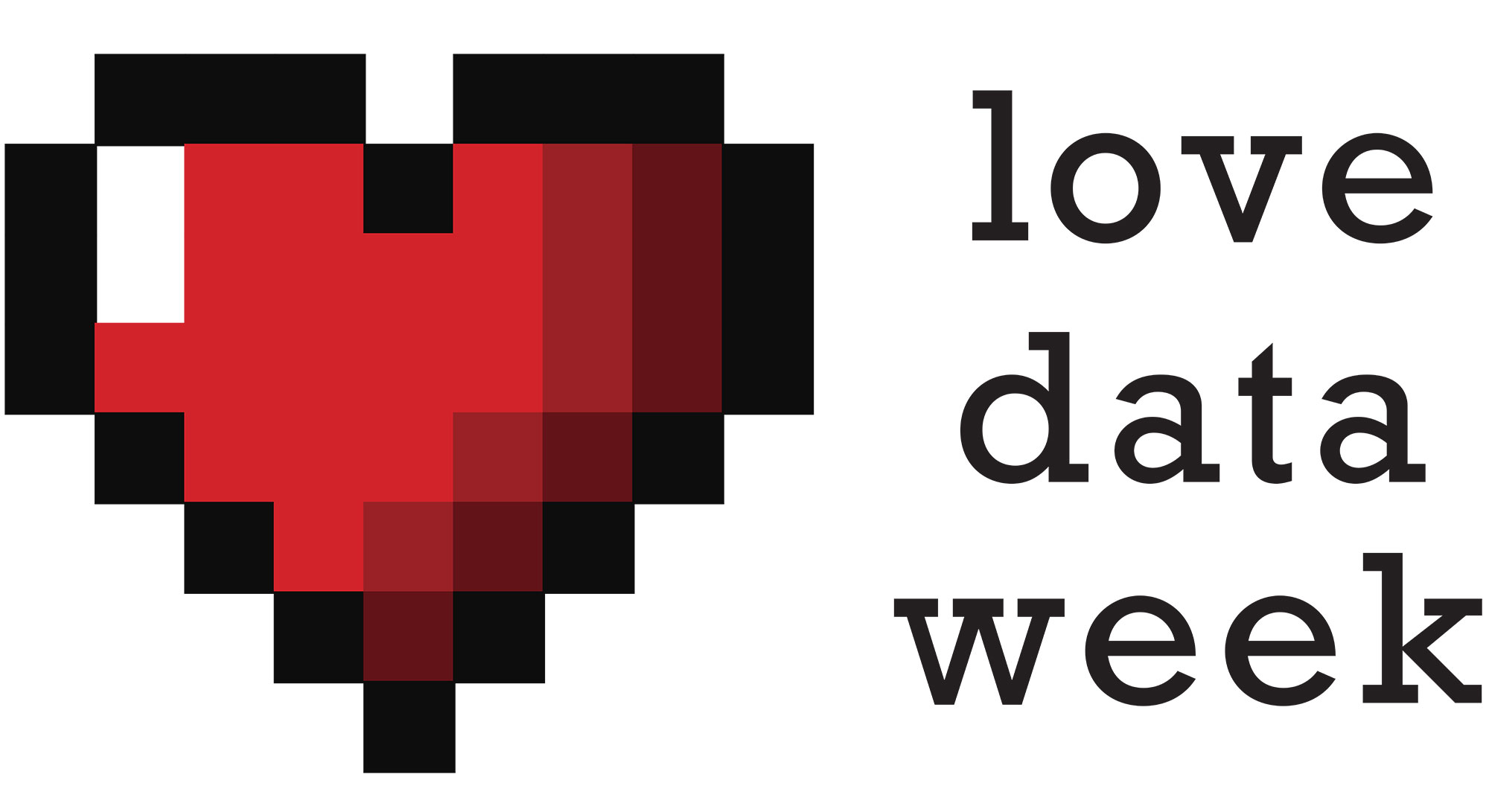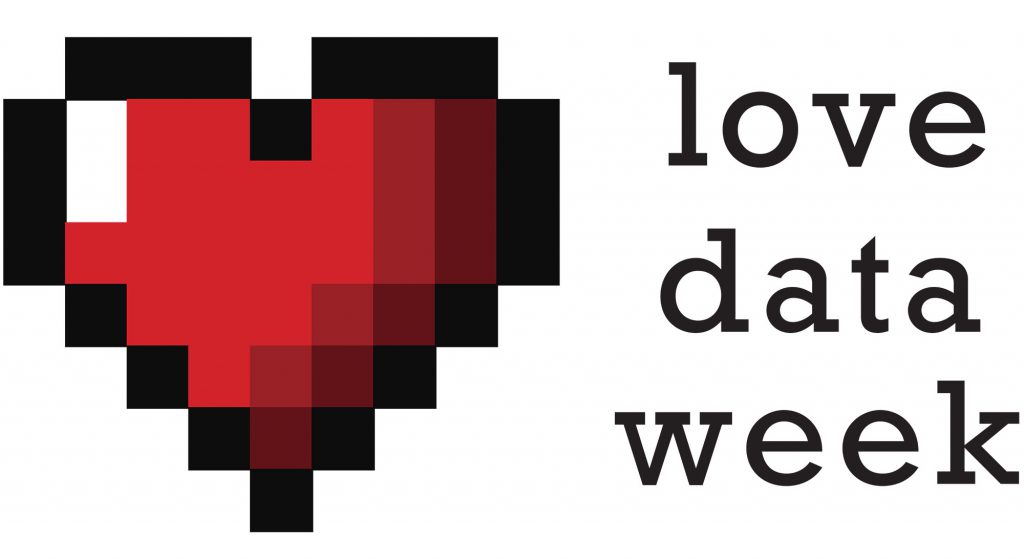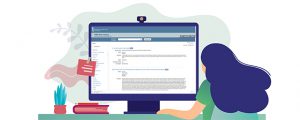
601 West Lombard Street
Baltimore MD 21201-1512
Reference: 410-706-7996
Circulation: 410-706-7928
Follow our blog for CDABS updates, information about data and bioinformation related opportunities and events at UMB and beyond, and in-depth looks at useful tools and resources. Check out our research contributions (including supporting data and code) and presentations to see how we are enhancing the field of data and bioinformation.
Love Data Week 2026 Begins on Feb. 9
Posted on Tuesday, January 20, 2026

Love Data Week, set for Feb. 9 to 13, is an international celebration of all things data.
Each year, the Data and Bioinformation Services team at the Health Sciences and Human Services Library engages the university community on topics such as data management, sharing, wrangling, and visualization, as well as open and reproducible science.
This year’s theme is “Where’s the Data?,” which encourages us to think about data’s journey from collection through storage and preservation.
Join us for the events below.
Date and time: Wednesday, Feb. 11, noon to 1:30 p.m.
Location: Zoom
Registration: Register for the session (opens in a new window)
Need to access clinical or administrative data for research but not sure where to start? After a brief overview of HSHSL-supported data resources, this virtual session will feature experts from ICTR and PRC to explain the process of requesting UMMS EPIC data and administrative claims datasets.
This session is ideal for faculty, students engaged in research, and research staff. Accessing data does not have to be a mystery.
Speakers:
Date and time: Thursday, Feb. 12, 10 a.m. to noon
Location: HSHSL first floor
Stop by our table to grab a doughnut and chat with the HSHSL Data Services team. Then from 11 a.m. to noon, visit the HSHSL Positivi-tree and celebrate self-care for Valentine’s Day.
Date and time: Thursday, Feb.12, 1 to 2 p.m.
Location: Zoom
Registration: Register for the session (opens in a new window)
In this webinar, researchers will explore options for sharing qualitative data, with a special focus on the Qualitative Data Repository (QDR), to which the University of Maryland, Baltimore has an institutional membership. Participants will gain a clearer understanding of qualitative data sharing norms and practices across the social, health, and other human focused sciences.
The session will highlight practical steps researchers can take to keep qualitative materials organized throughout any project, which also can support future archiving and re use of the materials they collect. QDR’s Associate Director will further showcase examples of nuanced data sharing approaches from current published data projects, including sensitive data secured under different levels of access control, will demonstrate how the deposit process at the repository works, and highlight data available for pedagogical purposes as well.
This webinar is intended for faculty, students, and staff who are using qualitative or multi method techniques. It is especially useful for those preparing data management or data sharing plans (DMPs or DMSPs) for federal or private foundation funding applications.
Speaker: Dessislava Kirilova, Associate Director, Qualitative Data Repository
Dates: Feb. 9 to 13
Location: HSHSL
Find one of our chart displays around the HSHSL and try your hand at writing a creative and funny caption.
Questions? Contact: Amy Yarnell, Head of Data and Bioinformation Services ayarnell@hshsl.umaryland.edu
Open Access Week Challenge 2025
Posted on Monday, October 6, 2025

The HSHSL is celebrating International Open Access (OA) Week with a five-day challenge designed to improve discovery of your scholarly work! Each day we will email you with a brief but meaningful activity, including:
If you complete any of the activities and fill out our evaluation survey at the end of the challenge, you will be entered to win some library swag!
Sign up to receive daily challenges from October 20-24, 2025.
If you want to learn more about how the HSHSL supports Open Access, visit the Open Access LibGuide.
Contact publishing@hshsl.umaryland.edu with questions.
Love Data Week at UMB Begins on Feb. 10
Posted on Wednesday, January 29, 2025

Love Data Week (Feb. 10 to 14) is an international celebration of all things data! Each year, the Data and Bioinformation Services team at the Health Sciences and Human Services Library looks forward to engaging the University on issues like data management, sharing, wrangling, and visualization, as well as open and reproducible science.
This year’s theme is “Whose Data Is It, Anyway?” which asks us to consider “who owns data compared to who uses data” and to think about “where the data came from before using it.”
Check out the week’s events below:
Looking for more ways to participate?
Don’t forget to follow the HSHSL and Love Data Week on social media! #LoveData25 #UMBLovesData
Questions? Contact Amy Yarnell, Head of Data and Bioinformation Services, and Christine Nieman Hislop, Data Services Librarian at data@hshsl.umaryland.edu.
July Data Drop: Check Out These New Datasets Published in the UMB Data Catalog
Posted on Monday, July 29, 2024

Every month, we will be highlighting new datasets added to the UMB Data Catalog. The UMB Data Catalog facilitates discovery of data by providing a searchable and browsable collection of records describing datasets generated by UMB researchers. Sharing a record of your data in the Catalog is also a great way to demonstrate compliance with data sharing policies!
These latest records showcase data on opioid treatment availability, COVID-19 misinformation on TikTok, and immune response in HIV-infected patients.
Congrats to our UMB researchers on these publications!
Title: County-level factors associated with a mismatch between opioid overdose mortality and availability of opioid treatment facilities
Description: Identifies characteristics of United States (US) counties with high rates of opioid overdose mortality and low rates of opioid treatment facilities.
Authors: John G. Rizk, Jannat Saini, Kyungha Kim, Uzma Pathan, Danya M. Qato
URL: https://datacatalog.hshsl.umaryland.edu/dataset/224
Title: #Coronavirus on TikTok: user engagement with misinformation as a potential threat to public health behavior
Description: Examines factors associated with user engagement with COVID-related misinformation on the social media platform, TikTok.
Authors: Jonathan D. Baghdadi, K.C. Coffey, Rachael Belcher, James Frisbie, Naeemul Hassan, Danielle Sim, Rena D. Malik
URL: https://datacatalog.hshsl.umaryland.edu/dataset/225
Title: IFNa induces CCR5 in CD4+ T cells of HIV patients causing pathogenic elevation
Description: Investigates whether elevated circulating interferon-alpha (IFNα) promotes widespread immune cell alterations and persists post-therapy, furthering understanding of why non-elite controller (EC) HIV patients continue to need treatment.
Authors: Hélène Le Buanec, Valérie Schiavon, Marine Merandet, Alexandre How-Kit, Hongshuo Song, David Bergerat, Céline Fombellida-Lopez, Armand Bensussan, Jean-David Bouaziz, Arsène Burny, Gilles Darcis, Mohammad M. Sajadi, Shyamasundaran Kottilil, Daniel Zagury, Robert C. Gallo
URL: https://datacatalog.hshsl.umaryland.edu/dataset/226
Thanks to Metadata Librarian, Eva Greitzer for creating and compiling these records!
Want to see your data listed in the UMB Data Catalog? Submit this form to get the process started.
Questions? Email us at data@hshsl.umaryland.edu.
A Model for Centralizing Data and Bioinformation Services at the Health Sciences and Human Services Library. Courneya JP, Yarnell A. Project Briefing presented at: Coalition for Networked Information (CNI) Fall Membership Meeting; 2020 Nov 10 - Dec 15; Virtual.
(CDABS primary work)
Creating campuswide engagement opportunities with library professionals through promotion of Love Data Week 2020. Yarnell A, Courneya JP. Posted presented at: Medical Library Association, Mid-Atlantic Chapter (MAC/MLA) Annual Meeting; 2020 Oct 19-21; Virtual.
(CDABS primary work)
Delayed microglial depletion after spinal cord injury reduces chronic inflammation and neurodegeneration in the brain and improves neurological recovery in male mice. Li Y, Ritzel RM, Khan N, Cao T, He J, Lei Z, Matyas JJ, Sabirzhanov B, Liu S, Li H, Stoica BA, Loane DJ, Faden AI, Wu J. Theranostics. 2020 Sep 14;10(25):11376-11403. doi: 10.7150/thno.49199.
(CDABS contribution: Functional gene enrichment analysis)
Full-length IL-33 regulates Smad3 phosphorylation and gene transcription in a distinctive AP2-dependent manner. Luzina IG, Fishelevich R, Hampton BS, Courneya JP, Parisella FR, Lugkey KN, Baleno FX, Choi D, Kopach P, Lockatell V, Todd NW, Atamas SP. Cell Immunol. 2020 Nov;357:104203. doi: 10.1016/j.cellimm.2020.104203. Epub 2020 Sep 2.
(CDABS contribution: Bioinformatics, Visualization)
High-performance computing service for bioinformatics and data science. Courneya JP, Mayo A. J Med Libr Assoc. 2018 Oct;106(4):494-495. doi: 10.5195/jmla.2018.512. Epub 2018 Oct 1.
(CDABS primary work)
High-performance computing service in the Health Science and Human Services Library at University of Maryland Baltimore. Mayo A and Courneya JP. [version 1; not peer reviewed]. F1000Research 2018, 7(ISCB Comm J):1089 (https://doi.org/10.7490/f1000research.1115828.1)
(CDABS primary work)
PubRunner: A light-weight framework for updating text mining results. Anekalla KR, Courneya JP, Fiorini N, Lever J, Muchow M, Busby B. F1000Res. 2017 May 2;6:612. doi: 10.12688/f1000research.11389.2.
(CDABS contribution: Informatics, programming)